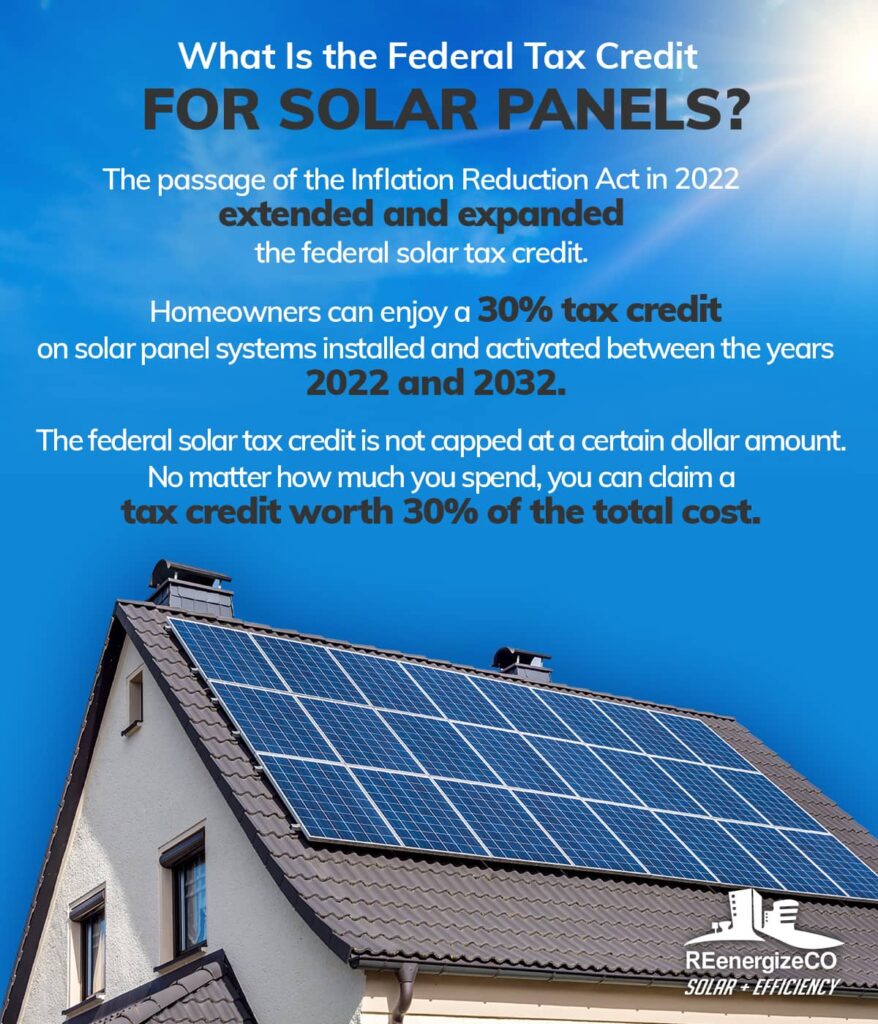
What Are the Tax Benefits of Installing Solar Panels?
When you install solar panels on your home, you start saving money on your electricity bill almost right away. Solar panels can dramatically reduce your monthly energy bill, starting on day one. It doesn’t take long for those savings to cover the installation costs, meaning you keep a little more money in your pocket each month.
But the savings don’t stop there. Not only will solar panels dial down your monthly energy bill, but you’ll also get one heck of a tax credit on your IRS filings next spring. It is Uncle Sam’s way of saying “Thanks for helping our country take a step forward.”
So how do you claim the federal solar tax credit for your clean energy? And what does it cover? Let’s dive in.
How Does the Federal Solar Tax Credit Work?
First and foremost, you should know that the federal solar tax credit is known more formally as the Investment Tax Credit (ITC). It’s part of a congressional effort to encourage more widespread adoption of solar panels throughout the United States – and it has been very effective in doing just that.
According to the Solar Energy Industries Association, the solar power industry in the United States has grown by 10,000% since the ITC went into effect. This has led not only to a greater adoption of residential and commercial solar nationwide, but billions of dollars for the U.S. economy.
The ITC was originally enacted in 2006. Until 2019, homeowners received a 30% tax credit when they installed solar panels. The tax credit dropped to 26% for systems installed in 2020 and 2021.
Fortunately, the passage of the Inflation Reduction Act in 2022 extended and expanded the federal solar tax credit. Homeowners can once again enjoy a 30% tax credit on solar panel systems installed and activated between the years 2022 and 2032.
To qualify for the federal solar tax credit, you must:
- Own the system outright (it cannot be leased)
- Install new, never-used-before solar panels and other equipment (used systems and components do not qualify for the ITC)
- Have the solar panels installed on your primary or secondary residence located in the United States
OR - Install the solar panels at an off-site community solar project in which you are participating
One of the most attractive features of the ITC is that the tax credit covers the “total cost of installation.” This can include:
- The solar equipment itself
- Solar consultant fees
- Installation fees
- Electrician fees
- Engineering fees
- Permitting expenses
- Wiring
- Tools, parts, and equipment (whether purchased or rented)
- Freight shipping costs
- Installation of solar battery storage
The federal solar tax credit is not capped at a certain dollar amount. No matter how much you spend on your solar panel system from 2022–2032, you can claim a tax credit worth 30% of the total cost.
Solar panel systems are far less expensive than they were even a few years ago, both in terms of the equipment itself and the costs of installing it. How much you spend will largely depend on how extensive a system you decide your home needs.
Before you start the installation, it is important to get a home energy audit to assess your home’s efficiency and identify opportunities for energy savings. A home energy audit is key for designing an effective solar panel system. What’s more, the cost of the audit can be calculated as part of the tax credit.

Tax Deductions vs. Tax Credits
It’s important to understand that the ITC is a tax credit, not a tax deduction. What’s the difference? We aren’t accountants or attorneys, but we’ll take a quick stab at the distinction:
- A tax deduction generally refers to a portion of your income that is exempt from income tax (usually because you had to spend that income on a business expense or because it was covered by another deduction allowance, such as the standard deduction).
- A tax credit, meanwhile, is a dollar-for-dollar reduction of the total amount of income tax you have to pay.
So, if your total tax bill for the year is $14,000 but you earn a federal solar tax credit of $5,000, then you can reduce the amount by $5,000 off your tax bill just like that. You’d only owe $9,000 in income tax for the year. (These numbers are offered purely as a hypothetical illustration; be sure to discuss your specific tax situation with a qualified tax professional in your area, as your tax situation may be more complicated.)
Generally speaking, tax credits offer more profound tax savings than tax deductions do. Too many websites and blog articles talk about the ITC as a “tax deduction.” Don’t be misled. We’re talking about a federal tax credit here – and that’s a big deal.
Who Can Claim the Federal Tax Incentives for Solar Power?
The federal solar tax credit is available to residential solar adopters as well as commercial entities anywhere in the United States. Although the majority of residential adopters are homeowners, you can also claim the ITC if you are a “tenant-stockholder at a cooperative housing corporation” or have membership in a condominium. Per the U.S. Office of Energy Efficiency & Renewable Energy, your tax credit will encompass “the amount you spend contributing to the cost of the solar PV system.”
Homeowners can claim the ITC if they install solar panels on a secondary residence (such as a vacation home). You will be unable to claim the federal solar tax credit, however, if the property is primarily a rental unit.
Finally, you are not eligible for the federal solar tax credit if the refund exceeds your tax liability for the year. However:
“Homeowners may get a tax refund at the end of the year due to the tax credit, if the reduction in tax liability means there was overpayment during the year. This can often occur when employers deduct taxes for employees over the course of the year. However, such refund is still limited by the taxpayer’s total tax liability. However, you can carry over any unused amount of tax credit to the next tax year.”
Why This Is the Year to Go Solar If You Can
Nothing lasts forever, and the federal solar tax credit is no exception. Starting in 2033, the federal tax credit will drop to 26%. In 2034, the ITC will be further reduced to 22%. After that, unless Congress extends it again, there will be no residential tax credit on solar panels.
What About State and Local Incentives?
Some states have also introduced tax credits, rebates, and other incentives to encourage the growth of solar energy. Unfortunately, Colorado does not have a state tax credit for solar panel systems.
However, this does not mean that our state is lacking in support for solar. Public utilities throughout Colorado offer incentives for customers to switch to solar, including:
- Rebates on solar panel systems (like the one offered by Fort Collins Utilities)
- Net metering – excess solar energy is “sold” back to the electric company, resulting in a credit on your bill
- Xcel Energy Solar*Rewards – Xcel will pay you for your contribution to the power grid in exchange for renewable energy certificates
- Battery Connect – another Xcel Energy program, this one pays customers $1,250 when they connect a solar energy system with battery storage up to the power grid
Residential solar adopters are also exempt from sales tax on solar panels and other equipment involved in the installation of your energy system. In addition, “Renewable energy personal property that is located on a residential classified property, owned by the residential property owner, and produces energy that is used by the residential property is exempt from Colorado property taxation.”
How Do I Claim the Federal Solar Tax Credit?
You will need to complete Form 5695, Residential Energy Credits and file it as part of your annual tax return. As we all know, tax documents can be complicated. If you have any questions, it is in your best interest to contact a tax professional for assistance.
Contact REenergizeCO Today
Savings on your federal taxes are just one of the many benefits of investing in solar energy for your home. Whether you are looking for savings on your monthly energy bills, greater independence from the grid, and/or a way to reduce your environmental impact, a solar panel system can help you achieve all of these goals and more.
Getting started, however, can be daunting. One of the biggest challenges is finding the right solar energy company. Reasons to choose REenergizeCO include:
- Experience: Our team has completed solar panel installation projects on hundreds of homes in Denver, Fort Collins, and throughout the Front Range.
- A Comprehensive Approach to Home Energy Improvements: We start each solar upgrade project with a home energy audit to identify how efficient your home is and what changes need to be made. This enables us to design a solar energy system specifically for your home.
- Technology: We install durable and long-lasting solar panels that can power your home for decades.
- Transparent Pricing: Your budget is important to us. When you hire REenergizeCO, we will always be upfront about how much your switch to solar will cost.
- Assistance with Savings: Once your solar energy is installed, REenergizeCO doesn’t stop work there. Our team will help you apply for any rebates and take advantage of other incentives. (Your savings account will thank you!)
Need help installing solar panels? Get in touch with REenergizeCO today to schedule your initial consultation!
"*" indicates required fields


